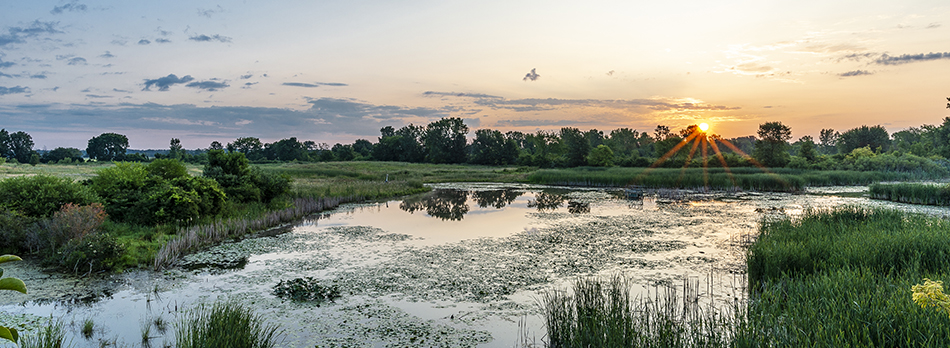On June 10, 2019, the partner organizations of the Southeast Michigan Resilience Fund announced that seven projects had been selected to receive $1.46 million in grant funding to boost the resilience of communities and restore wildlife habitats in southeast Michigan.
“Linking communities to nature though habitat restoration and green stormwater infrastructure is a major triumph,” said Susan White, U.S. Fish and Wildlife Service refuge manager for the Detroit River International Wildlife Refuge. “The Service looks forward to seeing the benefits from the wonderful projects this fund is supporting in its inaugural year and is grateful to the many applicants for their vision and dedication to building a new greenbelt in southeast Michigan.”
The grants awarded by the National Fish and Wildlife Foundation (NFWF) will leverage $2.5 million in matching contributions to generate a total conservation impact of more than $4 million.
“The Southeast Michigan Resilience Fund exemplifies the strength of public-private partnerships,” said Chris Korleski, director for the U.S. Environmental Protection Agency, Great Lakes National Program Office. “The fund brings together corporate, federal, and non-governmental partners, leveraging Great Lakes Restoration Initiative funds to deliver on-the-ground projects that make a difference in communities by reducing stormwater runoff, restoring habitat and improving water quality in the Great Lakes basin.”
These community-driven investments will strengthen regional resilience by installing green infrastructure, adding more than 2.4 million gallons of stormwater storage, and reducing the threat of flooding and other intensifying environmental stressors. Additionally, projects will restore critical habitat for wildlife and create or enhance public access to and use of natural areas and parks across five counties.
“The USDA Forest Service is proud to share in the investment of improving water quality and public access to natural areas, with the additional benefits of habitat restoration and reducing the potential for flooding in Southeast Michigan,” said Bob Lueckel, acting regional forester for the Eastern Region. “The benefits of these projects will strengthen urban and rural communities and help provide a stronger connection to the outdoors in Detroit and surrounding areas.”
The grants, which were the first awarded by the fund, will support projects that also will:
- Restore and enhance 733 acres of wildlife habitat;
- Create and improve more than 16 acres of neighborhood green space;
- Help restore the quality and connectivity of the region’s unique habitats;
- Improve quality of life for residents by increasing public access to natural areas and parks for communities across five counties; and
- Reach more than 9,500 people through direct engagement or education.
“The Southeast Michigan Resilience Fund demonstrates how public-private partnerships can measurably strengthen resilience of habitats and communities at a regional scale,” said Jeff Trandahl, executive director and CEO of NFWF. “These inaugural grants are an excellent example of how investments to improve resilience and restore habitat and water quality can achieve a dual community benefit, by reducing flooding and increasing public access to natural areas and parks.”
Seven corporate, foundation and government funding partners joined together to create the Southeast Michigan Resilience Fund.
The fund is supported by contributions from:
- ArcelorMittal
- The Fred A. and Barbara M. Erb Family Foundation
- The Kresge Foundation
- The Ralph C. Wilson, Jr. Foundation
- The U.S. Environmental Protection Agency
- The U.S. Department of Interior’s U.S. Fish and Wildlife Service
- The U.S. Department of Agriculture’s U.S. Forest Service
“The grants in the city of Detroit do more than address stormwater and environmental issues,” said Wendy Lewis Jackson, managing director of Kresge’s Detroit Program. “The grants support the engagement of residents, themselves, to ensure that they shape and benefit from the changes to be put in place. Our Detroit Program’s highest priority is on seeing neighborhood-based, resident-led organization broadly included in revival of our neighborhoods.”
“The work funded by these grants will help protect Southeast Michigan residents from increasingly strong and sustained storms that are amplified by the climate crisis,” added Dr. Jalonne L. White-Newsome, senior program officer with Kresge’s Environment Program, noting that 2019 was the third-wettest April on record in Detroit.
Photo of the Detroit River International Wildlife Refuge is courtesy of the U.S. Fish & Wildlife Service.

